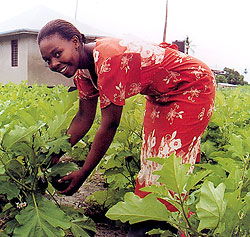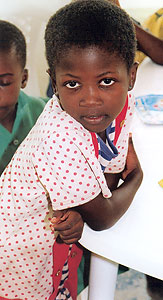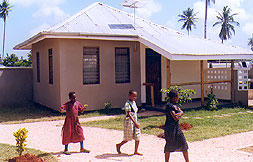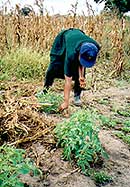The first month at Mbagala
An interview with Mama Argentina, "in-charge", and Mama Witness, family liaison officer.
What changes have taken place since you started in December 2000?
If we consider the children, there have been very big changes. Most of them were malnourished and looked weak. Many of them had worms of different kinds. Now, as you can see, they are happy, active and they have the energy to help in the garden and with the cleaning of their houses. At the beginning they didn't know how to use latrines, keep themselves clean, make their beds and so on. They have made a lot of progress in personal hygiene. Then there were those who used to make the others uncomfortable by squabbling and picking fights. This has stopped and there is understanding and cooperation amongst them.

Mary, the agriculturalist surrounded by aubergines
How come they have changed?
Through counselling. When we sit together we talk about all of us living as one family, that we must love one another and share with each other. They have to practise this. For example in the beginning we gave each girl her own toothpaste, but then we changed things so that girls in each house now have to share the toothpaste just like a family normally does. We have talked to them about friendship and how they have to support one another. We insist that they go to school together in a group and that when they are there that they should protect each other. If one is bullied by other school children, the other Mbagala girls should come to her aid. Shortly after we moved in we started up the "dada" system where one of the older girls acts as "big sister" for a group of the younger ones. Each house has a "dada" living with the younger children and she is supposed to look after them and ensure that the children are clean and that they tidy up the house in the morning before going to school. We staff members pass the houses when we come in the mornings to see how things are and the "dadas" enjoy competing amongst themselves as to whose is the best kept house.

Girl at KWETU
What changes do you see regarding yourselves as a team?
Big changes. in the beginning everyone worked within her/his own job description so to speak, the "in charge" did what was expected of an "in charge", the matron, the family liaison officer, the environmentalist and the other staff members did the same, worked within the frame of their own individual job descriptions. Nor since we've started having staff meetings and started discussing the various problems each of us is facing we have come to realise that we have to work as a team and help each other, so we can lend each other a hand, for example when things have to be tidied up outside. The feeling of being a team has prompted us to establish our own staff fund in case one of us runs into difficulties and needs help. Each of us contributes a certain amount each month. It is also important that the girls see us as a team, that they respect each of us whatever our job. The watchmen complained that the girls didn't heed what they said, so we held a meeting and explained to the girls that all staff members have to be respected. They also have to see that men and women can work together.
How did you experience the exchanges you have had with the Kigogo home for street boys during the two workshops?
We gained insight into their way of doing things and a direct result is that we have started holding weekly staff meetings where all staff members are present and where we discuss the children and other issues. Lazarus, who is now working for Save the Children, has been along to one of our staff meetings and will come once a month as a guide and to share the experiences he has from his years as "in charge" at the Kigogo Home. Another outcome of the workshops is that our special needs teacher has started making a weekly visit to each of the two schools attended by our girls to discuss the progress of the children and their problems with the teachers concerned.
Wee have found the exchanges with the staff at Kigogo extremely useful and we are very glad to have established a relationship with the staff there. We intend to continue the exchanges by holding a joint workshop once a quarter. The ides is that we chose a theme for each session.
We have also made contact with another project for street boys "Child in the Sun" at Mbezi and we visited that project just yesterday. They have a lot of farming activities and we plan to send Mary (the environmentalist at Mbagala) there very soon to have a look at what they are doing.
The first of the two solar workshops has just taken place so that key persons are becoming familiar with the solar equipment.

KWETU - Mbagala
What have been the greatest hurdles?
The water and the solar installations have caused a lot of problems. When there is no water, the girls have to fetch water from the day centre outside. They have to use the day centre's toilet and that is not easy at night. It is hard to keep the children clean under these circumstances.
We have had a lot of malaria and this can be partly because the water installations are not yet functioning properly and also maybe because we need to provide the matron with an assistant who can assist with supervising the girls. It takes a lot of time and supervision to get the young children to use the mosquito nets properly, to close doors and windows, indeed to understand why it should be done. Teaching children good habits takes a lot on time and patience as all parents know.
Another problem is that we are quite far from medical help and it is critical when a child becomes sick at night. we hope that in time we can employ a nurse who will also be able to assist the matron with other tasks.

Mama Argentina rounded off the interview with an account of her recent journey to Bukoba where she united one of the girls with her grandmother. It was a very uplifting experience. The child (8 years old) was an orphan and she did not know that she had a grandmother. She was very excited when she knew that she was not alone in the world and hat there was someone to love her. The journey to Bukoba took four days and Mama Argentina was a bit apprehensive about the reception they would receive. The grandmother didn't know the granddaughter although she had heard that her son had had a daughter. On their arrival in, they were met by the local Salvation Army representative who put them up for the night. Next day they were joined by a social welfare officer from the welfare department and off they went to the village. There they contacted the village elders who joined them for the meeting with the grandmother. The grandmother was understandably alarmed when she saw the huge delegation approaching her house. It had been impossible to contact her beforehand. once she understood that it was her granddaughter there was no end to her joy. You could not have wished for a better reaction. Mama Argentina explained how the girl had come to KWETU Mbagala and the services that the centre offers. All the people involved were amazed that Mama Argentina had travelled all that way to reunite the child with her grandmother and they were extremely positive. The welfare officer promised to check up on the girl once a month and send a monthly report to Mbagala. It turned out that there was a school nearby and the child was enrolled so that she could start the following week. Mama Argentina paid for the first school fees and the cost of the uniform and the grandmother would then do her best to keep the child in school in the future. The child apparently reacted very well. She was soon out playing with the other children, among them her cousins, as though she felt quite at home.
By Kate Girvan & Nasrin Siege
|

